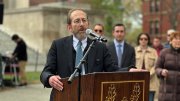In an email to the Harvard community on Friday afternoon, Interim President Alan M. Garber and Harvard’s deans released a statement clarifying University policy regarding “the guarantees and limitations” in campus protest and dissent. The clarification, released just days before students return for spring semester, comes as a response, the email said, to questions directed at University administrators in recent weeks amid the intense upheaval on campus over the October 7 Hamas attack on Israel and the ensuing war in Gaza.
Calling the guarantee of free speech “integral to the values of our University,” the email pointed to the specific requirements outlined in the University-wide Statement on Rights and Responsibilities, first adopted in 1970, which “defines the rights and duties we share as an academic community,” balancing “free expression” with “mutual respect.” The email was co-signed by the deans of Harvard College, the Radcliffe Institute, the Harvard Extension School, and all 12 graduate schools.
A crucial element of the Statement, the email said, forbids protest and dissent that amount to “intense personal harassment” or “grave disrespect for the dignity of others,” or that interfere with the “normal duties and activities” of other University members. These constitute “an unacceptable violation.” The email specifically called out the unauthorized occupation of University buildings. (Last November, pro-Palestine protesters occupied University Hall for 24 hours, a demonstration that led to disciplinary action.) Other forbidden activities include protests in classrooms, libraries, dormitories, dining halls, and offices—“unless a particular School makes an explicit exception.”
Protests must not block the entrances to buildings or rooms or block traffic and pedestrians, the email said. Assaults, threats, and intimidation—as well as damaging or removing a “properly posted sign”—are all prohibited. Disrupting lectures by invited speakers and other “events that expose community members to ideas, discussions, and debates” are also prohibited. The email directed each school within the University to designate venues for authorized protest: courtyards, event spaces, reserved classrooms.
“By providing guidance on the University-wide Statement, we reaffirm the essential function of our University, fostering an environment where community members learn from a vibrant exchange of ideas,” the email concluded.
This afternoon’s message came on the heels of an announcement from Garber earlier in the day about the launch of two presidential task forces to combat antisemitism as well as Islamophobia and anti-Arab bias. The groups will examine both the root causes and “recent history” of bias on campus and recommend approaches to address it. This announcement comes after months of criticism over Harvard’s handling of campus unrest surrounding the conflict in Israel and Gaza, and amid accusations of antisemitism and discrimination against pro-Palestinian demonstrators. In November, the Justice Department opened a civil rights investigation into antisemitism at Harvard and other universities, and a Congressional investigation is underway as well.
The presidential task force on combating antisemitism will be co-led by Derek J. Penslar, Frost professor of Jewish history, and Rafaella Sadun, Wilson professor of business administration at Harvard Business School. (The task force members were named after the conclusion of service by an advisory group on antisemitism appointed by former president Claudine Gay following allegations of antisemitism on campus and her widely criticized remarks in a December Congressional hearing).
The presidential task force on combating Islamophobia and anti-Arab bias will be co-chaired by Wafaie Fawzi, Saltonstall professor of population sciences and professor of nutrition, epidemiology, and global health at the Harvard T.H. Chan School of Public Health; and Asim Ijaz Khwaja, Sumitomo-FASID professor of international finance and development at the Harvard Kennedy School.
“Among the repercussions of conflict in the Middle East have been the loss of family and friends among many members of our community, as well as feelings of uncertainty, abandonment, mistrust, and fear,” Garber wrote in the announcement. “Reports of antisemitic and Islamophobic acts on our campus have grown, and the sense of belonging among these groups has been undermined. We need to understand why and how that is happening—and what more we might do to prevent it.” Garber said that he had asked the task forces to “undertake broad outreach” to the University community, and he urged community members to share their own perspectives and experiences “with equal measures of care and candor.”








